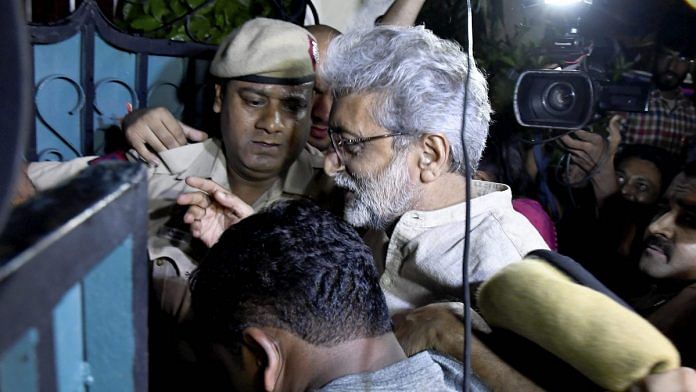A trial court was the first destination for the police and the accused the night five activists were arrested.
The arrest of five human rights activists in a multi-city crackdown Tuesday and subsequent scenes of resistance in courts is reminiscent of the Emergency era for those who have lived through the times.
The dramatic events also show that the first line of defence when asserting constitutional rights is trial courts and then the high courts that oversee them. The Supreme Court and its intervention, often touted as the panacea, is the last resort.
The crackdown
A trial court was the first destination for the police and the accused last night, after a template warrant (since same sections of law were applicable against them) was handed over to all five activists arrested.
A local magistrate had to examine the arrest warrant since it was issued in Pune. As per Section 80 of the Code of Criminal Procedure, a transit warrant is necessary to execute arrest warrants from a different jurisdiction. The district magistrate has to satisfy himself/herself that there is a prima facie case and allow the accused to be transferred out of the jurisdiction.
Also read: First they came after JNU, now it’s human rights activists: Umar Khalid
In all five cases, local magistrates in Mumbai, Faridabad, Delhi and Hyderabad granted transit warrants. The accused challenged the warrants issued by Delhi and Faridabad judges before respective high courts through a Habeas Corpus (recourse against unlawful imprisonment or detention) petition.
In the after-court hours hearing, the high courts expressed doubts if the trial courts had sufficient evidence to grant the warrants. Both the Delhi high court and the Punjab and Haryana high court wanted to put the accused in house arrest till they examined the warrants.
Among the five activists arrested, activist Sudha Bharadwaj and Gautam Navlakha got temporary relief from the Delhi and the Punjab and Haryana high courts.
The district courts in Faridabad and Saket had granted transit warrants against the two so that they could be taken to Pune. When high courts intervened and said it would first verify if there was sufficient material on record to grant such a warrant, Delhi local court and the police complied. The Haryana district court, however, insisted on receiving a true copy of the order but later reluctantly complied with the high court orders.
The ‘assassination plot’
On Tuesday, although the arrests were claimed to be made in connection with a Maoist plot to assassinate Prime Minister Narendra Modi, the warrants indicated no such thing. The provisions of law slapped against Gautam Navlakha and Sudha Bharadwaj were all free speech violations under the Indian Penal Code apart from those under the Unlawful Activities (Prevention) Act (UAPA).
The letter claimed as correspondence between Maoists and the activists is not even part of judicial records yet. Ostensibly, the arrests have been made because some members of the Kabir Kala Manch, a Pune-based cultural organisation, staged a play on 31 December at the Elgaar Parishad event, which contained alleged inflammatory references to a historical event that could have incited violence.
Also read: He’s making a list of ‘Urban Naxals’, but who is Vivek Agnihotri?
The application to a Pune magistrate on 7 June seeking custody of several activists, including Shoma Sen, Rona Wilson, Mahesh Raut, Sudhir Dhawale and advocate Surendra Gadling, for their alleged Maoist links is also based on these “inflammatory” references, made a day before the Bhima-Koregaon violence.
This is the purported inflammatory reference:
“Jab julm ho to, bagawat honi chahiyee shahar main, jab julm ho to bagawat honi chahiye shahar main… aur agar bagawat na ho to, behatar hai ki, rat dhalane se pahele ye shahar jal ke rakh ho jaye… ye shahar jal ke rakh ho jaye…”
(Read the original document here)
Emergency déjà vu
The judicial landscape during the Emergency was characterised by multiple habeas corpus writs in various high courts across the country. Many of them were filed by the BJP leaders who were detained under the draconian Maintenance of Internal Security Act.
At least nine high courts had upheld fundamental rights in many cases, prompting the government to move the Supreme Court. It was this highest court and custodian of the Constitution that failed its citizens in the 1976 case of Additional District Magistrate, Jabalpur vs Shivkant Shukla.
Four out of five judges upheld the presidential order that suspended the “right to life” under Article 21 during the Emergency. Although the apex court undid this ruling subsequently, it was totally eliminated only last year.
Also read: 10 activists arrested for Bhima-Koregaon violence. Nine names weren’t even in FIR
The independence of judiciary has mostly been debated recently in the context of CJI Dipak Misra’s actions and the tiff between senior judges. But the real test of an independent judiciary is how trial courts and high courts respond to unlawful arrests and threats to liberty.




These verses from the play are not meant to be taken literally. Any more than a thousand pieces speech on the JNU campus was. The local cops are accustomed to dealing with trial courts that sense when a case is a matter of prestige for the administration and go along. The officer from Poona who appeared before the Delhi High Court was unable to explain coherently what the nature of the charge against Shri Navlakha was. 2. On 7th Septembet, the apex court will have before it a record of how trial courts in different jurisdictions have dealt with a matter involving the personal liberty of citizens who have no criminal antecedents and have, in fact, a fine record of working to protect the rights of some of India’s poorest, least privileged citizens or speaking up for them. If it is not pleased with how this case has been dealt with, it may be pleased to issue / reiterate guidelines for the benefit of lower courts that may be called upon to deal with such cases in future.